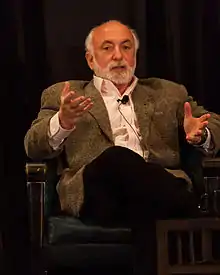Laurence Steinberg | |
|---|---|
 Professor Laurence Steinberg of Temple University | |
| Born | 1952 (age 71–72) |
| Nationality | American |
| Alma mater | Vassar College |
| Scientific career | |
| Fields | Developmental psychology |
| Institutions | Temple University |
| Doctoral students | Shelli Avenevoli |
Laurence Steinberg (born 1952) is an American university professor of psychology, specializing in adolescent psychological development.[1][2]
Career
Steinberg teaches at Temple University in Philadelphia, where he is a Distinguished University Professor in the College of Liberal Arts and the Laura H. Carnell Professor of Psychology and Neuroscience. He is a Fellow of the American Psychological Association, the Association for Psychological Science, and the American Academy of Arts and Sciences. Additionally, he has been a faculty scholar of the William T. Grant Foundation and was director of the John D. and Catherine T. MacArthur Foundation Research Network on Adolescent Development and Juvenile Justice. Steinberg is a former president of both the Division of Developmental Psychology of the American Psychological Association and of the Society for Research on Adolescence.
Steinberg's research has focused on a range of topics in the study of contemporary adolescence including adolescent brain development, risk-taking and decision-making, parent-adolescent relationships, adolescent employment, high school reform, and juvenile justice. Steinberg proposed the Dual Systems Model of adolescent brain development. He has also been a frequent consultant to state and federal agencies and lawmakers on child labor, secondary education, and juvenile justice policy, as well as an expert witness in criminal trials of juveniles and young adults accused of serious violent crimes.
Steinberg has been the recipient of numerous honors, including the National Academy of Sciences Henry and Bryna David Lectureship; the Society for Research on Adolescence's John P. Hill Award for Outstanding Contributions to the Study of Adolescence; the Society for Adolescent Medicine's Gallagher Lectureship; and the Association for Psychological Science's James McKeen Fellow Award. Steinberg has also received several lifetime achievement awards from the American Psychological Association, including the Urie Bronfenbrenner Award for Lifetime Contribution to Developmental Psychology in the Service of Science and Society, the Award for Distinguished Contributions to Research in Public Policy, the Award for Distinguished Contributions to Developmental Psychology (formerly known as the G. Stanley Hall Award) and the Presidential Citation. In 2009, he was the first recipient of the Klaus J. Jacobs Research Prize for Productive Youth Development. In 2014, he received the Elizabeth Hurlock Beckman Award, a national prize given to professors who have "inspired former students to make a contribution to society."
Steinberg is the author of approximately 500 articles and essays on growth and development during the teenage years and the author, co-author, or editor of 17 books.
From 1983 to 1988, he was a professor at University of Wisconsin–Madison, and from 1977 to 1983, he was an assistant and associate professor at University of California, Irvine.[3] His PhD in developmental psychology is from Cornell University.[3]
In a New York Times request-for-comment about lowering the legal drinking age, Steinberg responded that it should be lowered from 21 to 19, but not to 18 as is more commonly debated.[4] At least two countries, namely Canada and South Korea, are known to have 19 as their drinking age.
He believes that the age of majority should ultimately remain 18, as any higher would result in too many adults being classified as children, and a lower number may result in too many immature individuals being classified as adults. Ultimately, he believes the age of maturity is somewhere between 15 and 22, on average.[5]
Bibliography
Books
- Adolescence
- When Teenagers Work: The Psychological and Social Costs of Adolescent Employment (with Ellen Greenberger)
- Crossing Paths: How Your Child's Adolescence Triggers Your Own Crisis (with Wendy Steinberg)
- Beyond the Classroom: Why School Reform Has Failed and What Parents Need to Do (with Bradford Brown and Sanford Dornbusch)
- The 10 Basic Principles of Good Parenting
- You and Your Adolescent: The Essential Guide for Ages 10 to 25
- Rethinking Juvenile Justice (with Elizabeth Scott)
- Age of Opportunity: Lessons From the New Science of Adolescence
- You and Your Adult Child: How to Grow Together in Challenging Times
Articles
- Steinberg, Laurence (October 11, 2014). "Thinking outside the box". Comment. New Scientist. 224 (2990): 30–31.[lower-alpha 1]
Notes
- ↑ Online version is titled "Thinking outside the box coming of age, little by little".
See also
References
- ↑ Claudia Dreifus (November 30, 2009). "Developmental Psychologist Says Teenagers Are Different". The New York Times. Retrieved August 19, 2015.
Laurence Steinberg, a developmental psychologist at Temple University in Philadelphia, is one of the leading experts in the United States on adolescent behavior and adolescent brain biology.
- ↑ "Laurence Steinberg". Temple University. Retrieved 2015-08-19.
Laurence Steinberg, Ph.D., is the Distinguished University Professor and Laura H. Carnell Professor of Psychology at Temple University.
- 1 2 Steinberg, Laurence (12 June 2013). "The influence of neuroscience on US Supreme Court decisions about adolescents' criminal culpability". Nature. 14 (7): 513–518. doi:10.1038/nrn3509. PMID 23756633. S2CID 12544303.
- ↑ Steinberg, Laurence. "Lower the Drinking Age to 19." The New York Times. 10 February 2015. Request for comment: His response.
- ↑ https://issues.org/steinberg-science-adolescent-teenage-brain-policy/